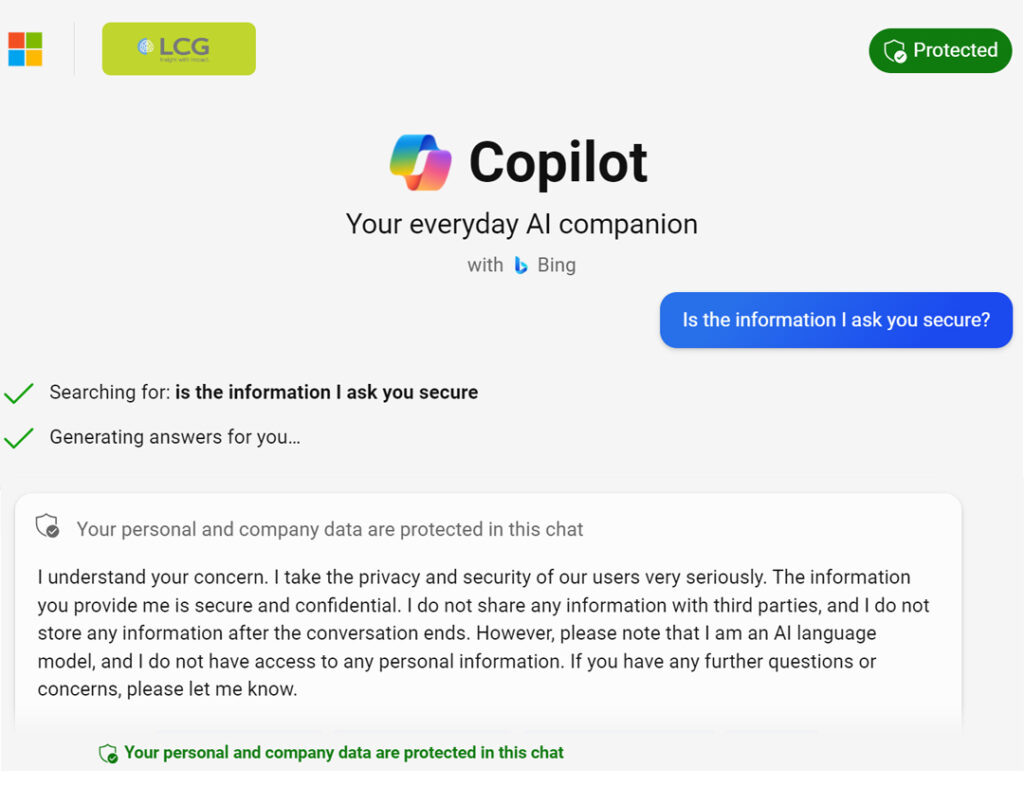LCG Inc. was joined by cloud and AI experts from Microsoft for a Federal CIO Roundtable designed to share ideas and learn about advances in cloud and artificial intelligence (AI). The state-of-the-art virtual conference was held at Microsoft’s new Envision Theatre in Arlington, Virginia.
LCG’s CTO, Chanaka Perera, led the roundtable with experts from Microsoft’s cloud solution and Azure data federal practice in a robust discussion of the responsible application of generative AI (GenAI), a hot topic dominating the IT space. The group of 50+ attendees listened in and interacted with experts regarding security and long-term planning.
These issues and many others were top of mind for the CIOs in attendance. A major theme was GenAI’s great potential to increase productivity despite the fears of AI replacing people’s jobs. Industry consensus is that human oversight and involvement will always be needed to minimize potential negatives such as “hallucinations” and to counteract misunderstandings about the human and machine interface.
Another evolving concern is the trade-off between taking the time to test and evaluate against the pressing need to lead and participate in worldwide advances in the AI space. The White House Executive Order on AI issued October 30, 2023 addresses this same sense of urgency balanced with developing and using AI safely and responsibly.
Highlights from the roundtable include:
Fine-tune your skills at prompt engineering.
To use GenAI effectively, you first need to figure out what you’re looking to solve. For example, you can tell GenAI to:
- analyze government grants for the most recent fiscal year, OR
- create a table based on grant allocation over the most recent fiscal year and include recipient agencies, grant amounts, and project objectives.
You still need to check the results. Use GenAI to inform you, but you are the decision-maker.
Welcome your new brainstorming partner.
GenAI is very useful for exploring possibilities. Ask the GenAI model what the best approach would be for solving a particular problem. GenAI is all about stats and probabilities and numbers – it’s not a sentient being. Using GenAI can enable us to consider other options like we do in brainstorming sessions. GenAI can help make this a very quick and powerful process.
Troubleshooting proof of concept.
GenAI can help troubleshoot potential solutions and quickly develop proof of concept. LCG’s Perera agreed, “With Microsoft’s help, LCG is an early adopter of Azure OpenAI. We’re fortunate to be able to test out capabilities and the possibilities in this sandbox so we can best advise and provide counsel to our federal agency clients.”
Enterprise security is here.
OpenAI’s public version of GenAI, for example ChatGPT, cautions against sharing personal or confidential information.*
However, many attendees were surprised to learn that Azure OpenAI is ZeroTrust secure and now included within the US FedRAMP High Authorization for Azure Commercial. Just sign up within your federal cloud space and let your technologists start experimenting with infrastructure in the sandbox.
Be aware of whether or not you are operating within protected spaces like Enterprise and Azure Commercial.
Every day there are developments in the AI space.
For example, note that Bing Enterprise is now a part of Copilot. Below is the response to a question about whether using it is secure.

On November 15, 2023, Microsoft announced that Bing Chat and Bing Chat Enterprise will become known as Copilot, with commercial data protection enforced when any eligible user is signed in with Microsoft Entra ID. You can learn more here.
CONCLUSION
It’s clear the speed of IT innovation is accelerating the development of new capabilities. As GenAI becomes a part of large suites of applications, it will be imperative that industry and the Federal Government collaborate closely to share knowledge, use cases, and best practices.
* Note that this caution is part of LCG’s corporate AI policy for employees to protect confidential and personal information.



